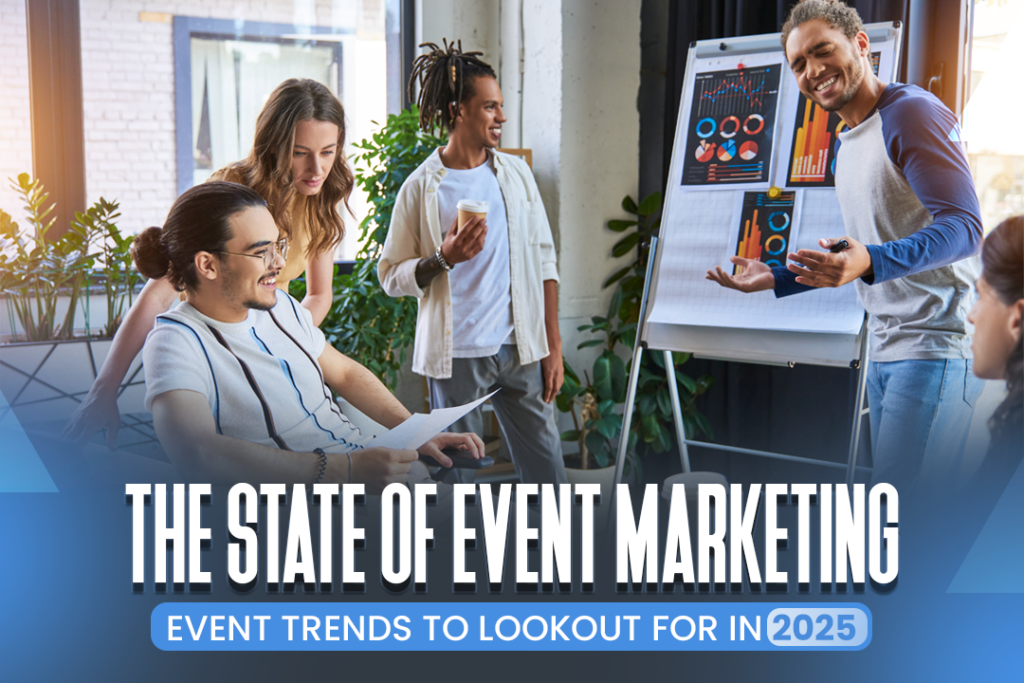
The event industry has witnessed a whirlwind of change in the past few years. In the post-pandemic years of 2021-2023, event attendees and event organizers suited themselves to the world of virtual and hybrid events. While Hybrid events are here to stay, there is an apparent boom in in-person events, which will continue for years to come— we shall explore it in the article at a deeper level. AI tools and changing expectations from a dynamic and evolving target audience have also forced event strategists to look beyond traditional event experiences and create path-breaking and impactful events.
As audience expectations soar, the demand for personalized, seamless, and immersive experiences is at an all-time high. The future of events is bright, and it’s clear that the possibilities are endless. To foray into the state of event marketing, here are the top event trends to look forward to in 2025.
Top Trends in the Event Industry to Look Forward to in 2025
The event industry has been soaring for the past two years. In the post-pandemic era, the event business has picked up with the rise in in-person events and advanced event technologies. As per a report published by the Business Research Company, the market reached approximately $1,227.3 billion in 2024, reflecting a strong recovery and growth phase. Projections indicate that the industry will grow to $1,346.92 billion in 2025, representing a compound annual growth rate (CAGR) of 9.7% from the previous year.
Especially after the AI boom and the increased focus on improving the attendee experience. If 2023 and 2024 saw event marketers and event organizers emphasize experiential marketing and seamless operational efficiency, the year 2025 is likely to witness elevated efforts to attract new event attendees while retaining the old ones.
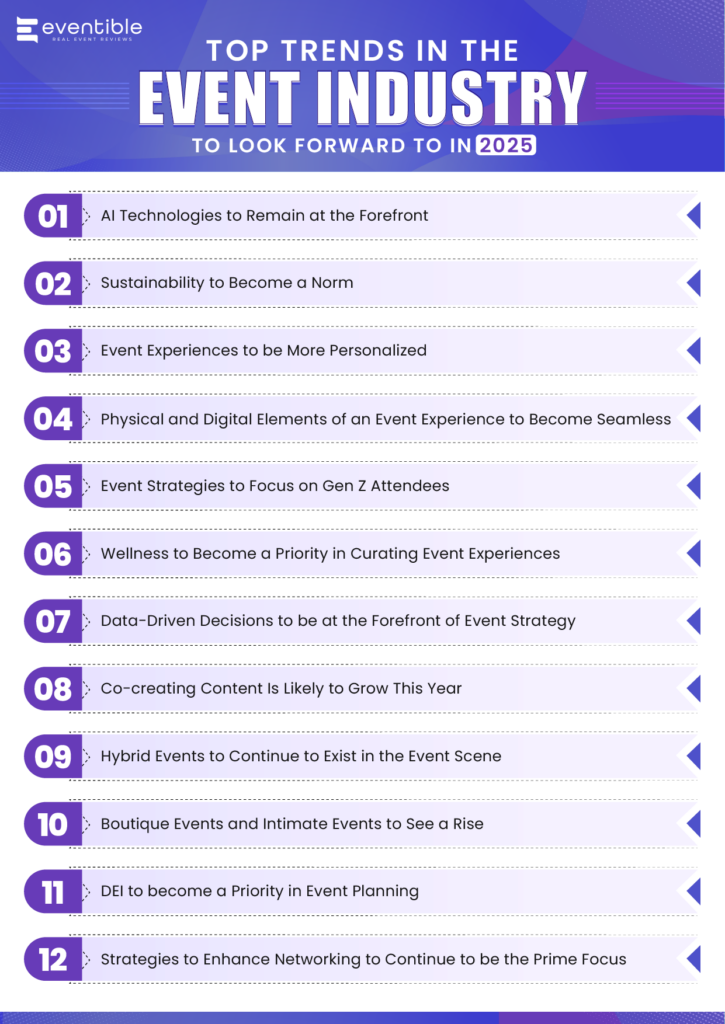
AI Technologies to Remain at the Forefront
A report published by Demand Spring shows that event marketers are actively adopting AI Technology to boost productivity by 76% and increase customer engagement by 52%. Adopting new technologies is not a move because of FOMO but rather, it comes from a place of using AI as a potential tool to enhance event strategy. The onset of AI technology across industries has given an impetus to the overall B2B industry. Be it automobile, service sector, food and beverage, procurement, or any other industry, AI has replaced manual labor and is generating increased productivity for all stakeholders. This AI wave has hit the event industry as well, leading event organizers to make it an integral part of their event strategy and planning process.
As per a report on B2B Marketing published by DBS, artificial intelligence will significantly transform content creation and lead generation. In 2024, 85% of marketers report AI-driven content strategies, with 57% using AI chatbots for deeper insights. So, AI technologies are certainly here to stay and will be one of the most potent event trends to look out for in 2025.
These numbers are indicative of the fact that AI tools are no longer the ‘new thing’ in the market. In the past two years event professionals have successfully adopted and made AI technology an integral part of their core marketing and event strategy. The year 2025 will see the use of AI to personalize event experiences for attendees by collecting their data in advance and creating unique experiences for them.
In our conversation with Nick Borelli, Marketing Director of Zenus Inc. and a celebrated event professional, we learned that AI enables event professionals to personalize event experiences for attendees.
“AI is finding its way into all phases of events from research such as the site selection tool DestinAItor, to 150 different planning tools found in Spark, accessibility enhancements with Wordly, exhibitor ROI with Backtrack, and attendee behavioral analysis with Zenus. All these tools and more are taking tactical time off the desks of event professionals, which allows them to be more strategic in their work.”
Another AI expert in the event industry Art Bortego told us that some of the technologies to keep an eye out for are – Smart RFID with Edge AI, Beacons, Vision AI: Facial analysis, and Facial recognition
Sustainability to Become a Norm
Environmental consciousness has slowly penetrated the minds of consumers and has become an integral part of their lifestyles. Every consumer today looks for eco-friendly options for their everyday needs as they want to actively contribute towards conserving the planet.
According to a Neilsen study, 81% of global consumers believe organizations should implement sustainable practices. Event planners have begun incorporating sustainable practices into their event planning due to the rise of conscious consumerism. From the choice of the venue to the registration process to locally sourced catering to energy-efficient practices during the event, green event management practices attract loyal event attendees.
From a logistical perspective, this means cost savings and higher turnover rates. When you go green, you will attract sponsors who share similar eco-conscious values, thereby contributing to creating environmentally conducive and sustainable events. For more strategies on making an event sustainable, read our article, 19 Innovative Strategies for Achieving Sustainability in Events.
Event Experiences to be more Personalized
The year 2025 will continue seeing curated attendee experiences for enhanced engagement. Although this trend has been on an upswing in the past two years, data-driven decision-making and the increased use of AI tools will take the event personalization game to a whole new level.
These days, the event experience begins at the tip of your attendees’ fingers. From the moment they install the event app and register with their details, the AI tools in these apps collate their data and create curated content suggestions, tailored agendas, and personalized networking suggestions for them.
Additionally, the insights from data analytics enable event organizers to create an event based on attendee profiling to suit the individual needs of every event attendee.
When guests feel seen and valued, their inclination to come back to the event in the forthcoming year increases, and as an event organizer, your overall ROI on the event is higher. The Internet of Things( IoT) also contributes to creating personalized experiences for attendees. From facial recognition check-ins, real-time crowd flow management, and personalized lighting to temperature controls, IoT enhances the attendee experience and operational efficiency.
Physical and Digital Elements of an Event Experience to Become Seamless
Phygital or experiential events have been integral to event management strategy for the past two years and will continue to reign in 2025. Event marketers are looking for more and more ways to make event experiences more immersive and personalized to cater to individual attendees’ needs. The availability of sophisticated event apps, social media integration tools, AR and VR experiences at the event, holograms, and much more have blurred the lines between the physical and the digital.
According to a report published by the Virtual Market Research Website, the Global Phygital Solutions Market was valued at approximately USD 25 billion in 2023 and is projected to grow at a CAGR of 11.2% from 2024 to 2030. By 2030, the market is expected to reach USD 52.5 billion.
Interactive technologies like AR, VR, and IoT can elevate an event experience and make it memorable for all event attendees. With the presence of data-driven technologies and event marketers looking for more ways to create a lasting impact in the minds of attendees, the intersection of physical and digital elements in creating mind-blowing event experiences is here to stay.
To learn more about these events and real-life phygital events, you can read our article, 18 Great Experiential Marketing Examples To Inspire Your Next Event.
Event Strategies to Focus on Gen Z Attendees
One of the key reasons for adopting advanced experiential marketing tools is to appease the increasing Gen Z crowd attending global B2B events. As per a report published by the Tradeshow Executive website, 18% of attendees at conventions, meetings, and conferences are under 25, reflecting a six-percentage point increase from the previous year.
In conversation with Art Bortego, an event technology expert specializing in AI-powered attendee insights, we discovered that
“AI is revolutionizing the event industry, delivering unprecedented insights and engagement. Personalized onsite experiences are evolving due to the accelerated growth of AI, Chatbots, integrated with attendee tracking technology, and experiential technologies including improvements in digital signs, conversation AI avatars, parametric speakers, smart lighting, and even digital scent diffusers.
Gen Z values experiences over possessions and looks forward to elevated personalized event experiences when they sign up for an event. Brand activations and recreational activities at events will be designed to sync with the sensibilities of the Gen Z crowd culturally.
Wellness to Become a Priority in Curating Event Experiences
Physical and emotional well-being will be a point of focus while planning event schedules, unlike previous years, where event agendas were packed, leaving attendees to choose their favorite sessions. With wellness being the main focus, there will be more breaks and wellness sessions to ensure attendees feel at ease and have the opportunity to rejuvenate from their busy schedules.
One of the key reasons for wellness being prioritized in events is the constant digital connectivity and the need for people to remind themselves to be in the present moment. This trend will help improve emotional connections and positively impact the psyche of event attendees.
Data-Driven Decisions to be at the Forefront of Event Strategy
Data has been at the forefront of key business decisions across industrial sectors and will continue to be the case in the years to come. At a time when event marketers are looking for ways to cater to individual attendee needs, attendee data from social media, event apps, and registrations help them formulate strategies for better event experiences.
Alia stressed the importance of AI and its relevance in achieving personalized experiences. She said,
“Beyond efficiency, AI is also elevating personalization. By leveraging data-driven insights, AI can craft tailored attendee experiences, optimize speaker engagement, and enhance audience interaction—all with fewer resources. As technology advances, AI will continue to reshape how events are designed and delivered, making them more dynamic, efficient, and impactful.”
To put it in perspective, event marketers will use data derived from attendee data to gain insights and then use AI tools to create customized experiences for event attendees.
Data insights will also be used to calculate event ROI and to enable better real-time decisions to improve the quality and outcome of events.
Co-creating Content Is Likely to Grow This Year
Content creation in events will no longer be a one-way streak. Event planners will get event attendees to participate in activities to enable them to co-create content to ensure a more immersive experience.
The focus will shift from mere content consumption to collaboration for content co-creation. What does this really mean? Event planners will get potential attendees to actively contribute their ideas, propose session topics, and maybe co-present if they qualify. Other ways of getting attendees involved in content creation are by using online tools and event apps to facilitate idea generation, collaboration, and real-time feedback during the event. With the availability of social media tools, it is easy to get potential attendees to participate in content creation through live polls, contests, streaming opportunities, and much more. Many event attendees review these events on Eventible – the world’s first B2B event review platform which is accessed by event marketers, sponsors, speakers, and other potential event attendees. The reviews enable event stakeholders to make informed decisions about which event to attend, invest, or participate in.
All in all, attendees, speakers, workshop facilitators, and other industry experts will collaborate to create content to encourage diversity and a strong attachment to the whole event experience. After all, when attendees actively interact at the event they are bound to have a memorable event experience they would want to look forward to every year.
Hybrid Events to Continue to Exist in the Event Scene
With the growing importance of the metaverse and the rise in phygital approach to events, hybrid events are certainly here to stay. As per a report published in the Businesswire, driven by the hybrid event revolution, the global event market is touted to reach $ 1.76 trillion by 2029.
Additionally, hybrid events are cost-effective for many attendees who wish to have flexibility in their event experience, and the rise of immersive and interactive event experiences has broken the monotony of one-way interactions in hybrid events.
Although our research says, Hybrid events are here to stay, there are event marketers who think Hybrid events need to be put back on focus. Nick Borelli told us that
“I haven’t seen a hybrid evolution in years now. This doesn’t seem like a very innovative sector to me from my vantage point, as decreased demand has made competition over this space undesirable. The biggest letdown from this to me is the lack of opportunities for a diverse audience to have an opportunity to contribute to communities without a strong hybrid approach.”
That said, according to a majority standpoint, hybrid events will most certainly continue to be on the radar and might even become more prominent if event marketers begin to recognize it as a tool that can give impetus to attendee attendance, especially from diverse backgrounds.
Apart from hybrid events, the rise of intimate events and small gatherings is something to look out for in 2025.
Boutique Events and Intimate Events to See a Rise
Clients are increasingly looking for quality over quantity, where they give attendees personalized high-quality experiences to create maximum impact. Budgeting and the need for focused event experiences have led to the rise of this trend. A small gathering means lower costs and a targeted focus on a few influential people. It fosters deeper connections and meaningful networking opportunities. These kinds of events allow event organizers to opt for unique and mesmerizing venues. Some examples of these types of events are private dinners and lunches, pop-up experiences, workshop series, and meet and greet.
When asked about the event trends to watch out for in 2025, Alia Aljunied told us that
“..the rise of intimate, high-impact gatherings is shaping the future of events, with brands prioritizing quality connections over large-scale productions. These trends aren’t just passing shifts — they are fundamentally reshaping how events are designed, executed, and experienced.”
DEI to become a Priority in Event Planning
Ensuring diversity and inclusivity have become pivotal considerations for event marketers in the global event industry. Nearly 47% of millennials seek diversity and inclusion in potential employers, as per a Deloitte study. This expectation trickles down to the events they attend as well. Hence, it’s safe to say that DEI will be not just an event trend but more of a mandate in global event planning strategies as event organizers gear up to cater to all kinds of audiences. DEI also leads to increased engagement and better event experiences for all event stakeholders.
Strategies to Enhance Networking to Continue to be the Prime Focus
This may sound like a given but is always at the core of any event marketing strategy. Why do people attend events? The main reasons are for knowledge upgradation and building potent professional relationships. Event planners center their strategy around showcasing potential learning and networking opportunities for attendees, event organizers, and attendees. In fact, networking does not have to stop at the event. It can be a continuous year-round activity where you stay in touch with your attendee base through webinars, newsletters, mailers, contests, and much more.
Nowadays, event marketers are taking things to a whole new level when they opt for unique picturesque venues, city tours, immersive recreational programs, and much more. The idea is to provide the right amount of entertainment and enrichment to ensure all event stakeholders benefit from the event.
What to Expect in 2025
From our conversations with various event marketers, industry reports, and articles, we understood that in 2025, the event industry is doubling down on personalization, AI-driven efficiencies, and the blending of in-person and digital experiences. Attendees now expect curated, well-informed programming tailored to their interests and filled with surprise and delightful moments while AI streamlines planning, enhances engagement, and optimizes logistics.
Additionally, the rise of intimate, high-impact gatherings is shaping the future of events, with brands prioritizing quality connections over large-scale productions. These trends aren’t just passing shifts but fundamentally reshaping how events are designed, executed, and experienced.
As mentioned in the section above, 2025 will continue to see some existing trends while there will be growth in some aspects. To begin with, there will be a boom in in-person events. According to a report mentioned in ATN Event Staffing, “ 74% of Fortune 1000 marketers plan to increase their event budgets in 2025, reflecting a renewed commitment to live experiences.”
Meanwhile, budgets and changing policies pose a bump for event organizers in the forthcoming year.
Elucidating on the challenges event marketers might face in the year 2025, Nick Borelli told us that,
“International events may have some big challenges in 2025 and beyond as nationalism pushes back against the globalization trends of the past few years of post-COVID life. Impacts on international goods pricing and potential travel friction could be disruptive to business conferences. Budgeting, in general, and forecasting budgets will be incredibly challenging due to the increasing volume and impact of variables.”
He went on to say that digital engagement is here to stay and reign, and using AI will elevate the overall performance of digital event tools.”
Lastly, community engagement will be seen as a potent strategy to engage attendees and transform them into event brand loyalists.
Actionable Takeaways for Event Marketers
Based on the trend analysis, data from event reviewers on Eventible, and the expert opinion of global event marketers. Here are a few key takeaways for event marketers to ace their game.
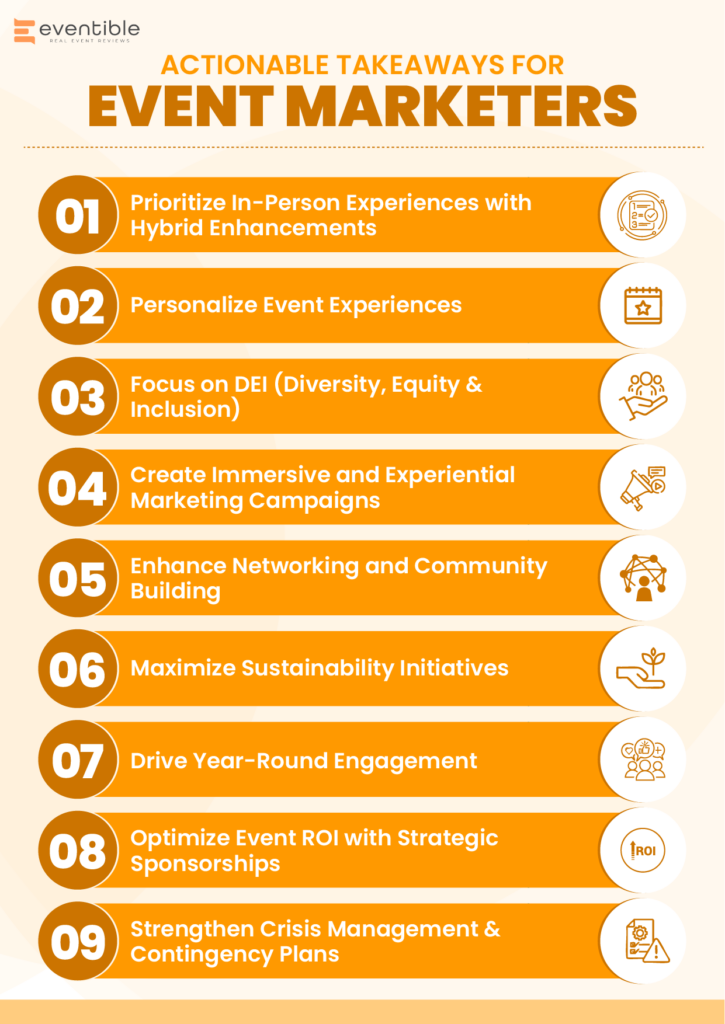
1. Prioritize In-Person Experiences with Hybrid Enhancements
Take advantage of the surge in live events by incorporating phygital elements like AR/VR activations and live streaming. The harmonious integration of in-person and hybrid elements can make events more accessible. Provide flexible attendance options to accommodate remote audiences and participants worldwide.
2. Personalize Event Experiences
In our conversation with Ajith Krishnankutty, Experiential Marketing Leader at Capital Group, he told us that he envisions a future where personalized event experiences are the norm. Ajith emphasizes that the core of successful events lies in understanding and prioritizing each client’s unique needs, creating unforgettable and immersive experiences for attendees. As a forward-thinking event professional managing diverse teams, Ajith advocates for a harmonious blend of enrichment and entertainment, ensuring events remain relevant and captivating. He highlights the transformative impact of AI-driven technologies, which empower marketers to harness data insights, tailor experiences to individual preferences, and elevate the overall event experience to unprecedented heights.
3. Focus on DEI (Diversity, Equity & Inclusion)
Ensure a diverse lineup of speakers and inclusive programming for events. Select venues and locations that reflect DEI values to attract a wider audience. We’ve touched upon this topic above in detail.
4. Create Immersive and Experiential Marketing Campaigns
Invest in interactive experiences such as gamification, experiential zones, and metaverse integrations. As an event marketer, you can use e-user-generated content (UGC) to generate social media excitement and engagement. As mentioned earlier, make the most AI tools and data to ensure superior event experiences.
5. Enhance Networking and Community Building
Implement AI-driven matchmaking tools to facilitate valuable connections. You can provide structured networking opportunities, including roundtables, workshops, and mentorship programs. Community engagement has a lasting impact and can turn new event attendees into event loyalists who would want to register for the event every year.
6. Maximize Sustainability Initiatives
As discussed earlier, sustainable practices are no longer a fashion statement but a cultural mandate. Minimize waste by using digital-first marketing materials and eco-friendly event practices. Collaborate with vendors and sponsors who are committed to sustainability.
7. Drive Year-Round Engagement
Relationship-building is critical when it comes to attracting and retaining event attendees.
To achieve this, you can turn events into ongoing content hubs with post-event webinars, newsletters, and discussion forums. Create event communities on platforms like LinkedIn and Discord to maintain continuous engagement. This way, people recognize your event as a strong brand and are continuously engaged with it.
8. Optimize Event ROI with Strategic Sponsorships
Offer tailored sponsorship packages that align with brand objectives, such as exclusive VIP sessions and product demonstrations. Leverage data insights to demonstrate ROI for sponsors and stakeholders.
9. Strengthen Crisis Management & Contingency Plans
Be ready for last-minute changes with flexible event strategies. Have backup technology solutions ready to avoid disruptions in hybrid and virtual settings. By keeping these actionable takeaways in mind, you can craft effective event strategies to create path-breaking events for the ever-evolving global events audience.

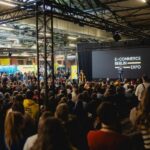
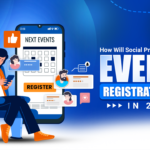

Comments are closed.